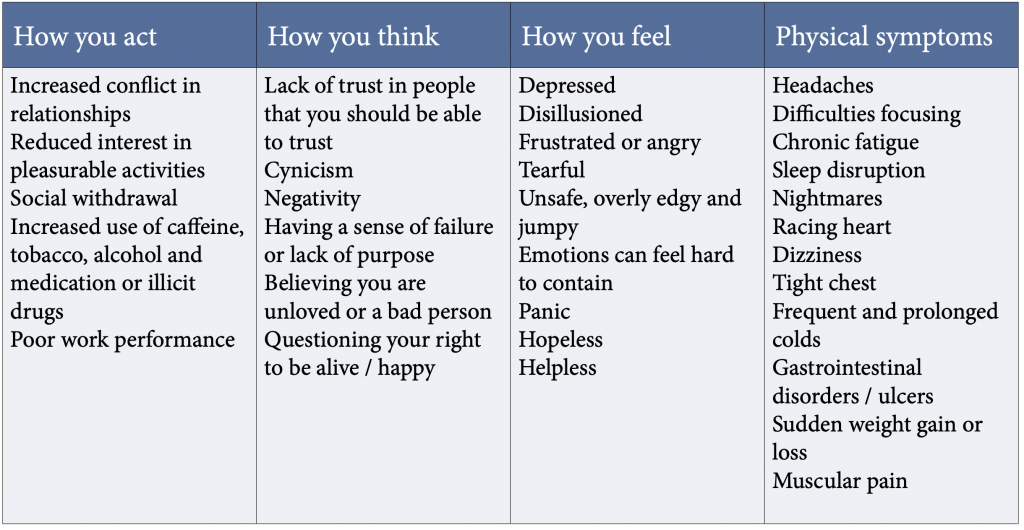You wouldn’t dream of going on a job without appropriate physical protection and risk assessment – but how well do you protect yourself mentally?
You may think that you are constitutionally stronger than most people and so you don’t need to think about this. But, being mentally strong is the same as being physically strong – we have to work at it. Mental resilience – the ability to endure and bounce back from adverse life events – varies just as physical resilience does. You probably spend time in the gym building physical strength and take pride in a healthy body. Some days you are on top form in the gym and others are harder. You may recognise those days as time to increase your nutrition, push through the pain or ease back on demands. But would you know how to do the equivalent for your brain? Would you even recognise a dip in your mental resilience?
Bodyguard work is mentally and emotionally demanding. Life-threatening situations, exposure to graphic scenes, distressed individuals, and violent perpetrators as well as occupational stressors such as unsocial working hours and being away from home can all mean that your mental resilience gets stretched.
If you imagine you have a high powered vehicle, fitted with bullet-proof glass and armoured shields, but nobody has bothered to top up the engine oil for a while, at some point when it is expected to perform at an optimal level, it may begin to cough and splutter. The more duress you put yourself in, the more frequently the engine oil needs topping up.
When resilience dips it can lead to chronic symptoms that not only impact on your health and wellbeing but, if not dealt with, may affect your safety and those around you:
- Difficulties concentrating
- Poor decision-making
- Slower reaction times
- Sudden outbursts of anger
- High risk behaviours
By being proactive about your mental body armour, you will build your personal resilience.
This means that you are more likely to maintain clear thinking in highly stressful situations and more likely to bounce back quickly from adversity.
Building resilience: 5 steps that your personal mind trainer would recommend:
1) Build and maintain awareness of your mental and emotional well-being
When you’re maintaining physical strength you pay attention to signs that something needs attention. You notice areas that are not performing as you would like and address them don’t you? Just as muscles and joints offer feedback on how they are dealing with physical challenges, so your mind does the same. Some common indicators that your resilience needs addressing are shown below.

2) Deal with the signs as soon as you notice them
Even if they are fleeting or mild, don’t just ignore or dismiss them. They won’t go away and chances are they will get worse. Pushing through the pain is not an appropriate strategy in this case. The first thing is to accept that you are a human being and your brain is wired to respond to threat in the same way as anybody else’s. It’s a primitive thing. After a challenging event, your brain has key tasks to complete:
- Process what happened and assimilate the emotional response that was suppressed during the event, and
- Switch off the alarm system and stop the production of stress hormones
Doing this, returns the body to an optimum calm state and restores higher level brain functioning.
3) Learn how to calm your mind
This is a skill that you can proactively build and there are several ways to do it. Find a technique that works for you. Here are some that are backed by research:
Mindfulness – this is the ability to remain in the “here and now” and can build your ability to manage strong emotions, maintain self-control in a healthy way (rather than suppression) and remain calm in a threatening incident. Our next article in the Circuit Magazine will focus on how to build mindfulness.
Meditation – it’s not about sitting cross-legged and “ohm-ing” – but if that works for you then go for it! Try the headspace app – go to www.headspace.com for details and a free App download that delivers a ten day programme.
Journaling – recognising and expressing strong emotions through writing is associated with positive mental health and wellness. It can help you to recognise behavioural patterns and stressors, facilitates the brain’s need to make sense of and process negative events and improves memory and problem solving skills. There is great advice on this technique at http://journaltherapy.com/journaltherapy/journal-cafe-3/journal-course
4) Build strong social support networks
Human beings are social animals. Having a supportive network of family, friends and colleagues is an effective way of relaxing, having a good work / life balance, maintaining our mental health and generally feel good about ourselves. In particular, the relationships you have with your peers can be protective and build resilience – your peers know what it’s like and can empathise with challenges. Many bodyguards come from an Armed Forces background where peer support is high and can recognise the value of a good peer social support system – these are people who can be trusted and who genuinely care.
However, many of us don’t have this or take our support network for granted. Do you rely on the same person for your social support? What would happen if they were suddenly unavailable? Consider whether you could improve your support network by increasing the number of people in it or by taking proactive steps to maintain existing relationships. Can you do one thing today to start this? This could be a phone call, an email, social media contact or a good old fashioned letter, an arrangement to meet an old friend, a potential new one or an existing one – all relationships need nurturing – how often do we let a good friendship slide because we’re so busy?
5) Look after yourself
When our mental resilience dips, ironically we often stop doing the things that build it.
Adrenaline and high risk situations can become a drug and so the more time we spend in that state, the more we have to rebalance by creating a mentally and physically calm state.
Relaxation and fun are two key words here. If you mentally switch off at this point or read them and roll your eyes – then this is actually a sign that your mental body armour is wearing thin! If we feel averse to taking time out to relax and have fun it most likely means that our brain has gone into a chronic stress state and wants to focus purely on survival and threat. Steps need to be taken to rebalance this or you could be headed for burnout. Ask yourself – what did I used to do that I really enjoyed and when did I last do that? The lower your resilience the less likely you are to feel motivated towards pleasurable activities. The key is to “fake it until you make it” – the good feelings will come back but you have to be disciplined and determined. And you know those are two things you can do!
We are always happy to answer your questions about resilience, mental health and traumatic stress on our blog www.powertorecover.co.uk/blog
Mental Body Armour – Have you got your Kit on?
By Dr. Liz Royle
You can get in touch via
Facebook: KRTS Power to Recover
Twitter: @KRTraumaSupport
Or email: office@krtraumasupport.co.uk
Take one step today to keep your mental body armour in place.


Leave a Reply